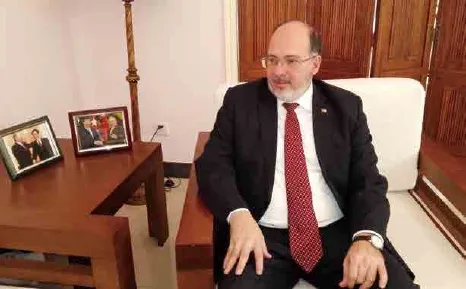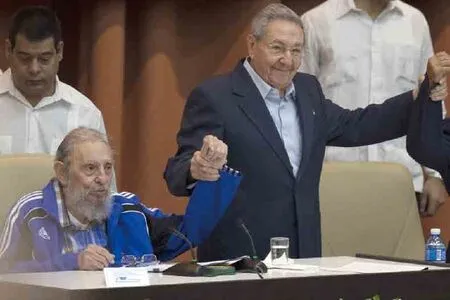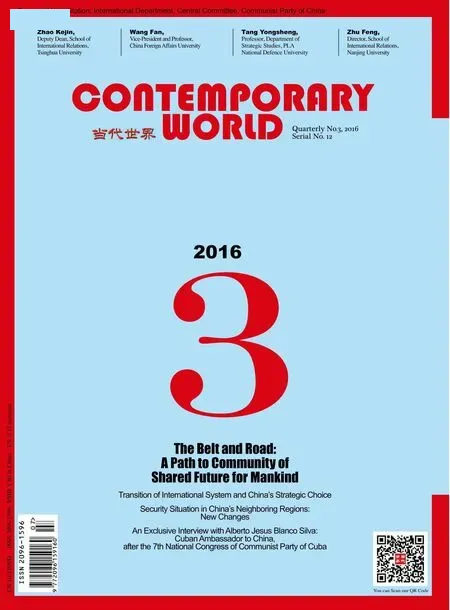An Exclusive Interview with Alberto Jesus Blanco Silva: Cuban Ambassador to China, after the 7th National Congress of Communist Party of Cuba
2016-09-20JoURNAlisToFCWM
JoURNAlisT oF CWM
An Exclusive Interview with Alberto Jesus Blanco Silva: Cuban Ambassador to China, after the 7th National Congress of Communist Party of Cuba
JoURNAlisT oF CWM

Alberto Jesus Blanco Silva, Cuban Ambassador to China
Q: On April 19, 2016, the 7th National Congress of the Communist Party of Cuba was concluded. Would you please speak about the main results of the congress and the features and content of the Outline of Five-Year Plan (2016-2021)?
A: The 7th National Congress of the Communist Party of Cuba clearly reconfirms to continue to build a prosperous and sustainable socialism and to maintain the principles of justice and equality as the basis of revolution and reconfirms that the renewal of economic and social system is irreversible. At the same time, it illustrates the political maturity of the Party and its ability to assess and work out important factors such as guiding economic and social policies.
As an important result of the congress, General Raul Castro Ruz is reelected First Secretary of the Central Committee of the Communist Party of Cuba. It is gratifying to the Cuban people and the people of other countries the world over that Leader of Cuban Revolution Fidel Castro Ruz attends the closing ceremony of the congress and speaks highly of the efforts made by Comrade Raul Castro.
The convocation of the 7th National Congress reinstates the practice of holding a national congress of the Party once every five years in accordance with the constitution of the Party. At the same time, it demonstrates that the Communist Party of Cuba is able to summarize its experience and lessons and the experience and lessons of others, reflecting on the past and planning the future of the country. As the process of economic renewal that began five years ago is irreversible,since the 6th National Congress of the Party, a standing committee for implementation and extension has been in place. Besides, the implementation of the outline of economic and social policies of the Party and the Revolution is discussed at least twice every year at the plenary session of the Party Central Committee and the regular session of the National Assembly of People’s Power. Besides, the revision of constitution and referendum that we call for are for similar purpose.
The 7th Congress deliberates and adopts four important guiding documents, which serve to, (1) summarize economic development in the past five years between 2011 and 2015 as in the report on the results of implementation of the outline of economic and social policies of the Party and the
Revolution and in the renewal of the outline for 2016 and 2021; (2) determine strategic industries for the basis of economic and social development plan of the country; (3) theorize the Cuban economic and social model of socialist development; (4) carry out the workof the Party as the task set by its First National Conference and instructions made by the First Secretary.

On April 19, 2016,the 7th National Congress of the Communist Party of Cuba was concluded. Raúl Modesto Castro Ruz (Right) and Fidel Alejandro Castro Ruz(Left) have attended.
Besides, the central report made by the First Secretary of the Central Committee of the Communist Party of Cuba is also adopted.
As part of the gradual rejuvenation of the Cuban leadership, limits have been put on the tenure and age of members of the high-level structure of the Party, such limits being just as good for state and government organs and people’s organizations pending the adoption by the National Assembly of People’s Power.
It is for the first time that the issue of theorization is made at the national congress of the Party, drawing upon the theoretic basis and essential features of the economic and social model, such a model being what we are aiming to achieve in the process of renewal.
The congress reconfirms that the socialist ownership of means of production will continue to be the principal form of Cuban economic ownership and, at the same time, reconfirms the objective of building on a sovereign,independent, socialist, democratic and prosperous country of sustainable development.
The 7th Congress renews the outline for 2015 and 2021. As a result of the congress, 50 articles are added to the new outline and it is decided for the outline to include atotal of 274 articles in 13 chapters. The paper for theorization, the renewed outline and the basis of plan 2030 will be subject to discussion of all members of the Party,members of the Young Communist League and representatives of people’s organizations and people of all walks of life in Cuban society.
Q: In your opinion, what is the intent of Cuba’s “Renewal of Economic Model” and what is its basic content?What are the results achieved? And to what degree will the renewal go?
A: In order to ascertain the outline adopted by the 6th Congress of the Party, the congress analyzes in detail the economic situation of the country,and thereby produces two kinds of solutions, one being the short-term solution, aiming to solve the most consequential problems, namely to create necessary conditions in infrastructure and production for transition to a higher level of development; the other being the long-term plan for sustainable development.
On the results achieved, it is necessary to especially point out that in the past five years, among the 313 articles of the outline adopted by the 6th Congress of the Party, 21% has been implemented and another 78%, on different stages of implementation. To this end,the congress adopts 130 policies and issued 344 rules and regulations, revised 55 and abolished 684 of them.
On foreign economic plan, a new law of foreign investment has become effective and the Special Economic Development Zone of Mariel has been put in place.
We have reorganized our debts and have all along performed our financial commitments, which help restore international credibility of Cuban economy. In spite of all this, it is necessary to face structural distortion of Cuban economy. At present, there are five tasks in Cuba crying for fulfilment:(1) to abolish monetary and foreignexchange double-track pricing system,(2) to realize necessary equity in salaries and wages according to quantity,quality and complicity of work, (3)to change the disadvantage of stateowned enterprises in face of continued growth of non-state sectors despite that state-owned enterprises having been announced to be the principal form of operation of Cuban economy,(4) to quicken the pace of development in agricultural and animal-husbandry,and (5) to meet problems arising from high index of aging of the Cuban population.
Q: In the 56 years since the establishment of diplomatic relations between China and Cuba, profound friendship has been built on between the two countries. How would you comment on China-Cuba relations?What are your expectations for the future of the bilateral relations?
A: Cuba-China relations are relations between two socialist countries and also exemplary relations of equality, mutual respect and mutual benefit between a big country and a small country. We can say that such a relationship is now at a very good stage.
The fact that Miguel Díaz-Canel,First Vice President of the Council of State and GeneralÁlvaro López, First Deputy Minister of Revolutionary Armed Forces led the Honor Guard Drill Team of the Revolutionary Armed Forces of our country to participate in China’s military parade in celebration of the 70th Anniversary of Victory of Chinese People’s War in Resistance of Japanese Aggression illustrates that Cuba believes that China made important contributions to thecauseagainst fascism and militarism for world peace and to the conclusion of the World War II.
In my view, we should continue to promote exchange of top-level visits and the practice of visits made by top leaders of both countries to one another when visiting Asia or Latin America and Caribbean. It is a concrete expression of the great importance we attach to the bilateral relations.
I must emphasize that no matter how the international situation changes, Cuba-China relations will forever be of strategic bearings. Cuba’s principled position on relations with China will remain unchanged. We agree with the remarks of the spokesperson of China’s Ministry of Foreign Affairs that the relations between Cuba and China are “neither spear-headed to a third party nor influenced by it”.
Q: What role do the relations between the Communist Party of China and the Communist Party of Cuba have played in promoting China-Cuba relations? What suggestion would you make for the relations between the two Parties?
A: The Party-to Party ties are one of the pillars and an important integral part of bilateral relations. In my opinion, the exchange of visits between members of central and local leadership of the two Parties and theoretic seminars between both sides have played an important role in enhancing dialogue and mutual political trust. The practice that either of the Parties after its important Party conference sends special envoy to visit the other serves the same purpose.
As a sign of maturity of relations between the two Parties, we have reached consensus of learning from each other,namely recognizing the necessity of exchanging experience while respecting each other’s practice in building socialism according national conditions. More important, the revolutions of two countries have begun and grown within either of the countries,and, under the leadership of the Communist Party of either of the countries,both countries staunchly build socialism and work for national stability and social consensus.
Q: In recent years, Cuban diplomacy has been very active. In your view,what are the continuity and readjustment of Cuba’s foreign policy?
A: Cuba will continue to struggle against hegemonism, unilateralism,power politics and overt and covert subversion, against using new information technology and social network technology to create instability, against double-standard in fighting terrorism and against forcing a single model on the world. At the same time, we will defend the effectiveness of principles of international law, strengthen the role of the United Nations, and stand for more active participation of the developing countries in the construction of a new international political and economic order.
We are willing to conduct a dialogue of mutual respect with the United States on the basis of respect and equality of sovereignty and buildup a new type of relationship with the United States. However, no one should expect Cuba to either give up its principles or comprise its sovereignty and independence.
In face of counter attacks by imperialism and oligarch on revolutionary and progressive governments in Latin America and Caribbean, Cuban diplomacy will take a higher profile of solidarity. Besides, we reiterate our solidarity and commitments to the Bolivarian Revolution and opposition to attempts to isolate Venezuela while conducting dialogue with Cuba.
Cuba will continue to contribute to mutual cooperation between Latin American and Caribbean countries with one and inseparable China.
Through its First Secretary Raul Castro, our Party reiterates that it is ready to develop relations with all legal political forces and movements regardless of their ideologies.
It is beyond any doubt that the positive development of relations between Cuba and member countries of the European Union and the agreement to be signed between both sides on political dialogue and cooperation will bring about new possibilities of mutually beneficial development of relations between both sides.
Cuban diplomacy will continue to be engaged to safeguarding world peace, promoting worldwide dialogue and firmly defending independence gained and upheld through the revolution.
杂志排行
Contemporary World的其它文章
- Distorting History Is Not Tolerable: An Interview with Soga Yuji, President of Japan-China Friendship Association for the 21st Century
- Analysis of the Rise of Spain’s“We Can” Party
- Prospects of Solution to Syrian Crisis
- Sharp Changes Took Place in Political Structure of Latin-American Countries: Causes, Impacts and Prospect
- Adjustment of EU Neighborhood Policy: From Value-Driven to Interest-Oriented
- “Thucydides Trap” and China-US Relations
